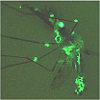The transgenic animals are designed to help stamp out dengue fever in the Cayman Islands
An Oxford-based research firm has announced the results of a release of genetically modified male mosquitoes in the Cayman Islands, the first experiment with GM mosquitoes to take place in the wild.
From May to October of this year, Oxitec released male mosquitoes three times a week in a 40-acre area. The mosquitoes had been genetically modified to be sterile, so that when they mated with the indigenous female mosquitoes there would be no offspring, and the population would shrink.
Mosquito numbers in the region had dropped 80 percent by August, which the researchers expect would result in fewer dengue cases.
Since it’s only females who bite humans and transmit diseases like the untreatable dengue fever this study examined, British biologists suspected that introducing males sterilized by a genetic mutation into the gene pool could dramatically decrease their numbers over time.
While many scientists and environmentalists object to killing off mosquitoes entirely for fear it would harm dependent species, Oxitec asserts that, since the sterilizing gene could not be passed on to subsequent generations, this method will have no permanent ecological impact.
Rather, GM males function like an insecticide, temporarily reducing numbers without the negative effects of using chemical toxins. They can also be more effective against insects that had developed resistance to certain commonly-used pesticides. In regions where booming mosquito populations are have caused epidemic outbreaks of dengue fever, yellow fever and malaria, dramatically reducing the population temporarily could reduce the death toll, and provide valuable lead time to vaccinate and treat hard-hit populations.
As the death toll caused by disease-carrying mosquitoes rises (over 2 million of the 700 million people infected by mosquitoes die annually), science has proposed a wide range of possible solutions to lessen the damage, from lasers to chemicals. But the release of transgenic animals into the wild is a very bold new step.
[AP]







Okay lets get this right, the experimentalist didnt believe the theorists figures when he said the population would be affected?
Perhaps the word play the theorist used, like 3/4s or perhaps as many as a quarter would be unaffected. I presume they also talked about the cycles and how as long as a few dozen got through subsequent cycles would return to normal.
This sounds like the experimentalists are a complete idiots or the test was actually about producing a viable sterile mosquito and they could have done that in a lab.
Which means they were actually after some other information not released in this article. So could someone please update this article to what the research was really about.
Or are the articles writers as stupid as this research. Perhaps car manufactures will take their cars out of their test areas and run them in different countries to say really they work here as well, well i never. Still we couldnt be absolutely sure the data was accurate for every road.
By the way the research is stupid. This paragraph sums it up.
While many scientists and environmentalists object to killing off mosquitoes entirely for fear it would harm dependent species, Oxitec asserts that, since the sterilizing gene could not be passed on to subsequent generations, this method will have no permanent ecological impact.
Its would be better to find and immunise everyone against dengue fever and irradicate the disease. But then again this research was done by a “research firm”.
Please just do the right thing and speak to the WHO and irradicate the disease and leave the humble mossy alone. I hate the stupid bug, but if i went around killing every bug i didnt like theyd be very few stupid experimentalists around.